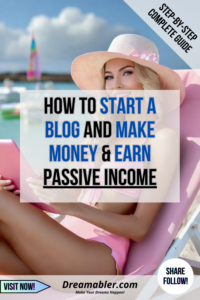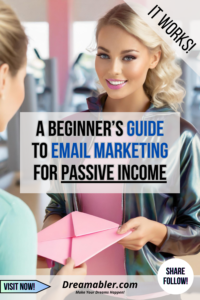Last Updated on February 7, 2024 by Mika
TL;DR: "Choosing Your Niche: A Comprehensive Guide" offers a step-by-step approach to finding the perfect niche for your online endeavors, whether it's for blogging, digital product creation, or any online business. It emphasizes the importance of aligning your passions with market demand, ensuring there's a willing audience for what you offer. The guide covers identifying your interests, conducting market research, analyzing competition, and considering monetization potential to ensure profitability. It also highlights the significance of creating a unique selling proposition (USP) to stand out and the necessity of testing and validating your niche with a minimum viable product (MVP) before fully committing.
You know, diving into the digital world is a bit like exploring a new city. You’ve got to find that one neighborhood where you feel right at home, and it also needs to have some great coffee shops (because, let’s face it, we all need our caffeine fix).
That’s what finding your niche in the online universe is like. It’s not just about picking a spot; it’s about choosing a place where you can thrive, make some noise, and yeah, make some dough while you’re at it.
You need to focus and select your niche if you are going to create a digital product to sell online and make money, you need to select niche also if you are going to start blogging you need a niche for almost everything you create online – at least if you are dreaming to making money online! So, let’s pay super close attention to the niche selection!
Why a Monetizable Niche?

So, why all this fuss about a monetizable niche? Well, imagine you’re at a huge music festival, but instead of vibing to the tunes, you’re there to sell your hand-painted T-shirts. If you set up your stall in the middle of a heavy metal crowd, but your shirts scream ’90s pop nostalgia, chances are you won’t sell much.
It’s not just about what you love doing; it’s also about finding people who’ll love what you do – and are willing to pay for it. That’s the sweet spot we’re aiming for.
The Market Size Matters
Now, let’s talk size – market size, that is. Ever heard the saying, “There’s plenty of fish in the sea”? Well, in the world of online business, we want to make sure that sea isn’t just a tiny pond.
We’re after a niche that’s like a bustling city market – lots of people, lots of buzz, and plenty of customers eager to buy. It’s all about striking the right balance between being a big fish in a small pond and being totally lost in the ocean.
Our Game Plan
What I’m going to walk you through in this article isn’t rocket science, but it’s definitely going to launch your online presence into orbit. We’re going to roll up our sleeves, do some detective work, and find that niche that fits you like a glove and fills your wallet.
So, grab your metaphorical flashlight and magnifying glass, and let’s embark on this treasure hunt together. Ready to find your niche and make it rain? Let’s dive in!
How to Choose a Profitable Niche Infographics

Understanding the Concept of a Niche

When we talk about a ‘niche’, what exactly are we picturing? Imagine you’re at a huge, bustling party. Now, a niche is like your own little corner in that party where the music, the vibe, and the people are just what you love.
In the world of digital content and product creation, a niche is that specific area where your passions, skills, and a group of interested folks intersect. It’s where you’re not just heard, but you’re also the life of the party for that particular group.
Niche: Not Just Any Corner, But a Golden One
But here’s the kicker – not all corners are created equal. Some are bustling with activity, while others are, well, just quiet corners. In the digital realm, a niche with monetization potential is like finding a corner where people aren’t just hanging out; they’re looking to buy what you’re selling.
It’s about identifying that space where your unique content or product is not just appreciated but is also something people are willing to open their wallets for.
Why Monetization Matters
Think about it – why do most of us venture into the digital world? Passion, yes, but also profit. There’s no shame in admitting that we all like a bit of the green stuff (and no, I don’t mean lettuce).
A monetizable niche ensures that your efforts aren’t just a drop in the ocean but actually make waves – financially speaking. It’s about connecting your passion with the market’s needs.
Finding your niche is like tuning a guitar. You want to hit the right notes that resonate with your audience and make sure those notes can turn into a melody that also pays your bills. Let’s strum our way to success!
The Intersection of Passion and Market Demand
Welcome to the crossroads where your heart’s desires meet the real world’s needs. This is where the magic happens. It’s like finding the perfect dance partner – your passion leads, and market demand follows. Let’s break this down into two key steps: spotting your passions and sizing up the market.
Identifying Your Passions and Interests
First things first, let’s dig deep into what makes you tick. Think of it as a treasure hunt where the treasure is your genuine interests.
Here’s a simple exercise:
- Grab a notebook and jot down activities that make you lose track of time, topics you can talk about endlessly, and skills that make you feel proud. This isn’t just daydreaming; it’s the first step to carving out your niche.
But here’s a pro tip – passion alone isn’t enough. It’s like having a supercar but no roadmap. So, while you’re listing your passions, ask yourself the crucial question:
- Can this be turned into something people would pay for?
This is where you start moving from passion to profit.
Researching Market Demand
Now, let’s put on our detective hats and dive into market research. We’re looking for clues that indicate a thriving market. Tools like Google Trends, social media analytics, and keyword research tools are your best friends here. They’re like the compass guiding you through the market jungle.
When you’re exploring these tools, keep an eye out for patterns:
- Are people asking questions about your passion area?
- Is there a buzz around certain topics?
These are signs of a market hungry for content or products. But the real deal is verifying the market size and the presence of buyers. Look for statistics, market reports, and even check out what your potential competitors are doing. Are they thriving? If yes, then bingo, you’ve hit a sweet spot!
Remember, the goal here is to align your passion with a market that doesn’t just nod in appreciation but also reaches for its wallet.
It’s about finding that intersection where your passion meets a line of eager customers. So, let’s get passionate about research, because in this world, knowledge isn’t just power, it’s profit!
Analyzing the Competition and Monetization Opportunities
Navigating the digital marketplace is a bit like being in a bustling bazaar. You’ve got to know not only what you’re selling but also what the guy next to you is offering. Let’s dive into why keeping an eye on your competition is not just smart, it’s essential for carving out your own success story.
Why Understanding Your Competitors Matters
Understanding your competition is like having a map in a treasure hunt. It points you to where the treasure is and, importantly, where it isn’t. But how do you do this effectively? Start by playing detective.
Use tools like: SEMrush or Ahrefs to peek into what your competitors are doing. What keywords are they ranking for? What’s their social media strategy? Think of these platforms as your digital periscope, helping you see over the horizon.
But here’s the real juice – learning from your competitors isn’t just about copying what they do. It’s about finding gaps they’ve missed, understanding their strengths and weaknesses, and tailoring your approach to stand out. It’s like finding a niche within a niche.
Considering Affiliate Products and Monetization

Now, let’s talk about turning your niche into a money-making machine. One of the best ways to do this? Affiliate marketing. Think of affiliate marketing as being a trusted advisor. You recommend products or services you believe in, and in return, you get a commission for each sale made through your referral.
To identify niches with solid affiliate marketing opportunities, start with platforms like:
These sites are like bustling marketplaces filled with products for every niche imaginable. But the trick is to choose products that align seamlessly with your niche and content.
For example, if your niche is in sustainable living, look for eco-friendly products on these platforms. Your audience is already interested in sustainability, so recommending products that align with this interest feels natural, not forced.
Remember, successful affiliate marketing is about authenticity and relevance. It’s not just about selling; it’s about enhancing your audience’s experience and offering them real value. So, choose products that you believe in and that resonate with your audience. It’s about making connections, not just sales.
Understanding your competition and leveraging affiliate marketing are like having a compass and a map on this journey. They guide you towards profitable paths and help you navigate the bustling marketplace with confidence. Let’s use these tools to carve out a niche that’s not just popular but profitable.
Defining Your Unique Selling Proposition (USP)
Alright, let’s chat about your secret sauce, that special something that makes you stand out in a crowd – your Unique Selling Proposition (USP). It’s like your personal superhero emblem in the digital world. But how do you find it, especially in a niche that’s not just a hobby but a money-maker?
Cooking Up Your USP
Finding your USP is like being a chef. You take a bunch of ingredients (your skills, passions, and market needs) and mix them up into something mouthwateringly unique. Start by asking yourself: What can I offer that no one else can? Maybe it’s your quirky writing style, an unusual approach to common problems, or perhaps you have unique expertise. This is about finding your flavor in the marketplace stew.
Strategies for a Winning USP
- Spot the Gap: Look for something that’s missing in your chosen niche. Is everyone doing X? Well, why not do Y?
- Personal Flair: Infuse your personality into your offerings. People don’t just buy products; they buy experiences and stories.
- Solve a Problem: Find a pain point in your niche and be the aspirin. If everyone’s scratching their head over something, be the one with the solution.
- Quality Over Quantity: Sometimes, being the best is enough. If you can offer a premium service or product, that alone can be your USP.
Real-Life USP Examples
- Let’s say you’re in the eco-friendly products niche. Your USP could be offering the most comprehensive guides on living a zero-waste lifestyle, backed by personal experiences.
- In the world of fitness, maybe your USP is a unique workout method that combines yoga and strength training, targeting a specific age group.
- Or, if you’re in the pet care niche, perhaps you offer personalized pet nutrition plans based on extensive research and expertise.
Your USP is your beacon in the digital world. It’s what attracts your tribe to you. So, let’s get those gears turning and find that unique spark that makes your offer irresistible. It’s not just about being different; it’s about being authentically you and filling a gap that no one else does. Let’s make your mark!
Testing and Validating Your Niche

So, you’ve got a niche in mind, and you’re buzzing with excitement. But before you dive headfirst into the deep end, let’s dip our toes in the water first. This is where testing and validating your niche comes in. It’s like a dress rehearsal before the big show. Let’s break it down.
Creating a Minimum Viable Product (MVP)
Think of an MVP as your niche’s first handshake with the world. It’s a simple, low-cost version of your product or idea designed to see if people are interested. Your MVP is your ‘proof of concept’ – a way to test the waters without going all-in on time and resources.
Here are some MVP ideas:
- Blog Series: If you’re into writing, start with a series of blog posts on your chosen topic. It’s a great way to gauge interest and collect initial feedback.
- Prototype Products: For product-based niches, create a basic version of your product. It doesn’t need all the bells and whistles – just the core features to test its appeal.
- Online Courses or Workshops: If you’re leaning towards educational content, try hosting a short, introductory online workshop or course.
Gathering Feedback and Making Adjustments
Now that your MVP is out there, it’s time to listen. Feedback is your goldmine. It tells you what’s working, what’s not, and how to pivot. Here’s how to gather and use it effectively:
- Surveys and Questionnaires: Simple, direct, and effective. Use tools like Google Forms or SurveyMonkey to get structured feedback.
- Social Media Engagement: Monitor comments, likes, and shares. Social media is a real-time feedback loop, so use it to your advantage.
- Analytics: Dive into website or product analytics. Look for patterns in user behavior. Are they staying, clicking, buying?
Once you’ve gathered feedback, it’s time for some honest self-reflection. What did people love? What didn’t quite hit the mark? This is where you adjust your sails. Maybe you need to tweak your product, write on different aspects of your niche, or even pivot slightly.
Validating your niche isn’t a one-and-done deal. It’s an ongoing conversation with your audience. It’s about being agile, receptive, and ready to evolve. Let’s turn that feedback into your stepping stone to success!
Considering Expandability and Relevance
Embarking on your niche journey is thrilling, but it’s like planting a tree – you want it to grow and branch out. Let’s explore how to pick a niche that not only fits today’s needs but also has room to expand and stay relevant over time.
Potential for Niche Expansion
Your niche should be like a good book series; it starts with one captivating story but has the potential for intriguing sequels. Here’s how to spot and develop such a niche:
- Look Beyond the Horizon: Start with a niche that’s specific, but don’t box yourself in. Ask, “Where could this niche lead?” For example, if you start with organic gardening, could you expand into sustainable living?
- Stay Tuned to Trends: Keep an eye on evolving trends within your niche. This helps you anticipate and lead into subniches naturally.
- Engage and Listen: Your audience is a goldmine of insights. Regular engagement can reveal new areas they’re interested in, guiding your expansion.
- Maintain Core Values: As you expand, keep the core values and interests of your original audience in mind. It’s like adding rooms to a house without altering the foundation.
Exploring the Edgy Alleys: Choosing a Daring Niche If You Dare

Imagine you’re wandering through the digital marketplace, a place as diverse and sprawling as the most eclectic city. You come across some alleys that are a bit more… let’s say, adventurous.
These are the niches that raise eyebrows and quicken pulses – areas like the enigmatic world of cryptocurrencies, the high-stakes realm of iGaming, or the bold territory of adult …content. Intriguing, right? And potentially quite profitable.
The buzz in these parts of the digital city is palpable. They’re like those hidden speakeasies or underground clubs where the air is electric with opportunity. Sure, they offer the allure of unique rewards, but navigating these streets requires a keen eye and a steady hand.
One of the biggest challenges? Well, it’s like trying to put up flashy billboards in the more conservative parts of town. Mainstream avenues for promotion, like the big social media thoroughfares and the well-trodden paths of Google Ads, often have their gates closed to these edgier districts. This means you might need to find more creative, less-traveled roads to get the word out. Or just stay with mainstream niches.
And let’s not forget the ever-changing landscape of these controversial niches. They’re like those parts of the city that never sleep, constantly evolving and keeping you on your toes. High rewards? Absolutely. But also higher risks and a need to always stay ahead of the game.
If you’re eyeing these neighborhoods for your digital venture, whether it’s an ebook, a blog, service, app, ecommerce store or any online business, think about carving out your path with alternative strategies. Dive into the world of SEO to attract organic visitors, engage with niche-specific online communities, or use the power of email marketing to build a loyal following.
You might also want to explore specialized advertising networks that are more welcoming to these daring niches or consider affiliate partnerships with companies that are no strangers to these edgy streets.
Remember, in these parts of the digital world, being bold and thinking outside the box isn’t just recommended, it’s essential. My advice for beginners is to pick some mainstream niche and save yourself from the headaches that closed doors may cause.
Steering Clear of Troublesome Territories: Navigating the No-Go Zones for Beginners

Imagine you’re a fresh-faced explorer in the vast digital landscape, backpack ready, and eyes sparkling with ambition. But wait! Before you set off, let’s talk a bit more about those parts of the map marked with caution tape.
These are the niches that might seem alluring with their siren calls, but for beginners, they’re like intricate mazes with hidden pitfalls. From advertising headaches to social media snags and payment processor puzzles, these areas can be a newbie’s nightmare. So, let’s shine a light on these tricky territories:
- Forex Trading: High risk, complex regulations, and often a tough sell on mainstream platforms.
- Adult Content: Faces strict advertising restrictions and social media bans, not to mention payment processing hurdles.
- iGaming & Betting: A regulatory minefield, with many platforms steering clear of advertising these services.
- Cryptocurrencies & ICOs: Highly volatile, subject to regulatory scrutiny, and often excluded from traditional advertising channels.
- Tobacco & Vaping Products: Heavily regulated with advertising restrictions across numerous platforms.
- Health Supplements (Especially Unverified or ‘Miracle’ Cures): Prone to legal challenges and often flagged on social media for misleading claims.
- Multi-Level Marketing (MLM): Often viewed with skepticism, faces advertising restrictions, and can be a hard sell to a wary audience.
- High-Risk Investments & Penny Stocks: Subject to strict regulations, and promoting them can be a minefield.
- Weapons and Ammunition: Heavily regulated with significant advertising and payment processing restrictions.
It’s wise to navigate around these niches. Stick to the well-lit streets and friendly neighborhoods where your digital journey can be as smooth as that first sip of your favorite latte in a cozy café. There are plenty of other niches where you can plant your flag and thrive!
Google’s E.E.A.T. Principle and Niche Selection
Google loves expertise, authoritativeness, and trustworthiness (E.E.A.T.). It’s crucial in niche selection, especially in sensitive areas like health and finance.
- Expertise: Are you well-versed in your chosen niche? For example, if you’re into wellness, do you have the credentials or profound knowledge to back it up?
- Authoritativeness: This is about being recognized as an authority. If you’re giving financial advice, are there credentials or successful track records to bolster your authority?
- Trustworthiness: It’s all about credibility. In niches like health, lacking the proper qualifications can not only dent your credibility but also lead to misinformation.
Steer clear of niches where you lack expertise, especially in fields where incorrect information can have serious repercussions. Always ask, “Am I qualified to speak on this topic?”
Choosing a niche with room for growth and sticking to areas where you can provide genuine, reliable information is like setting up a shop that not only attracts a loyal customer base but also has the potential to grow into a chain. Let’s pick a niche that grows with you and your audience.
Launching Your Niche-Focused Endeavor
You’ve done the groundwork, and now it’s showtime! Launching your niche-focused venture is like opening the curtains on your very own stage. Let’s ensure it’s not just a one-night show but a long-running hit.
Lights, Camera, Launch!
- Craft a Stellar Debut: First impressions count. Whether it’s your website, product, or content, make sure it resonates with your niche. It should scream, “I’m exactly what you’ve been looking for!”
- Tailor Your Marketing: One-size-fits-all? Not here! Your marketing strategy should fit your niche like a glove. If your audience hangs out on Instagram, be there. If they love email newsletters, hit their inboxes.
- Incentivize Early Adopters: Offer something special to your first few customers or subscribers. It could be a discount, extra content, or just a heartfelt thank you note. Make them feel like VIPs in your niche club.
Recap
Let’s quickly recap our adventure:
- We started by understanding the importance of a monetizable niche.
- We dove into the intersection of passion and market demand.
- We peeked at what the competition is doing and explored monetization, especially through affiliate marketing.
- We learned about carving out a unique selling proposition.
- We tested our niche with MVPs and gathered invaluable feedback.
- And we considered the expandability and relevance of our niche, keeping in mind Google’s E.E.A.T principle.
This isn’t just about starting a business or a blog. It’s about embarking on a journey that resonates with your very essence and connects with an audience that can’t wait to hear what you have to say or see what you have to offer.
What’s Your Niche?
Now it’s your turn! I’d love to hear about the niche you’re diving into. Share your chosen niche and any questions you have in the comments. And hey, if you’re hungry for more insights and strategies tailored to your specific niche, don’t forget to hit that subscribe button. Let’s make waves in our niches, together!
FAQ
What is a niche market?
A niche market is a specific, often small segment of a larger market that has its own unique needs, preferences, and identity.
Why is choosing the right niche important?
Selecting the right niche is crucial because it allows you to focus on a specific audience, reduce competition, and increase your chances of success.
How do I identify my interests and passions?
Reflect on activities you enjoy, topics you are knowledgeable about, and areas where you spend your free time. This self-reflection can help identify potential niches that align with your interests.
How can I analyze the competition in a niche?
Look at existing businesses in the niche, their offerings, customer reviews, and market presence. Tools like Google Trends, social media analysis, and SEO tools can provide insights.
What are some methods to test the profitability of a niche?
You can test a niche’s profitability by conducting surveys, creating a minimum viable product (MVP), or running small-scale marketing campaigns to gauge interest and willingness to pay.
How important is expertise in a niche?
While expertise can be a significant advantage, it’s not always necessary. You can learn about a niche or partner with experts. Passion and willingness to learn are often more important. For example, I have sold telescopes without knowing anything about stargazing, but I learned a lot about the topic when I built a blog for stargazers to sell high-quality telescopes as an affiliate!
Should I follow trends when choosing a niche?
While trends can offer opportunities, it’s important to differentiate between short-term fads and long-term trends. Sustainable niches often lie in areas with long-term demand.
What if the niche I’m interested in seems oversaturated?
Even in oversaturated markets, opportunities exist. Look for sub-niches, unique angles, or underserved customer segments. Differentiation is key in crowded markets.
How do I balance passion and profitability in a niche?
Find a middle ground where your interests meet market demand. Passion keeps you motivated, but profitability ensures sustainability. Research and testing are crucial to find this balance.
What are some common mistakes to avoid when choosing a niche?
Common mistakes include not conducting thorough market research, ignoring competition, overestimating demand, and choosing a niche based solely on personal interest without considering market viability.





